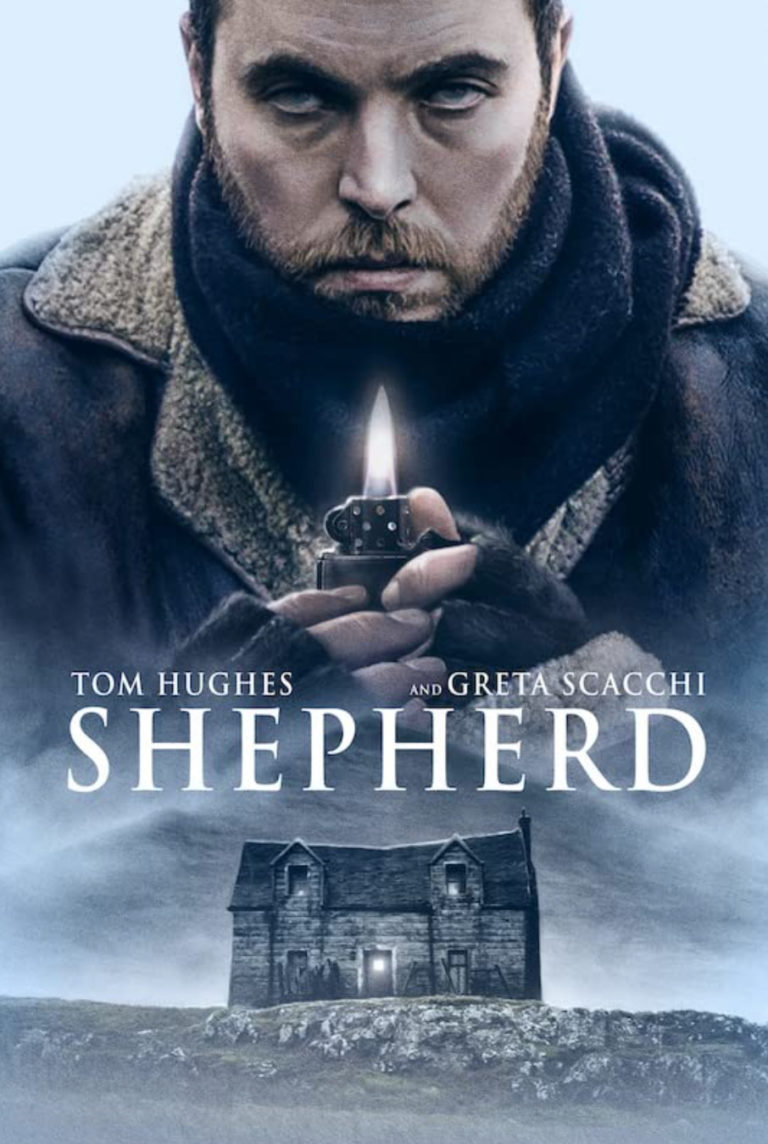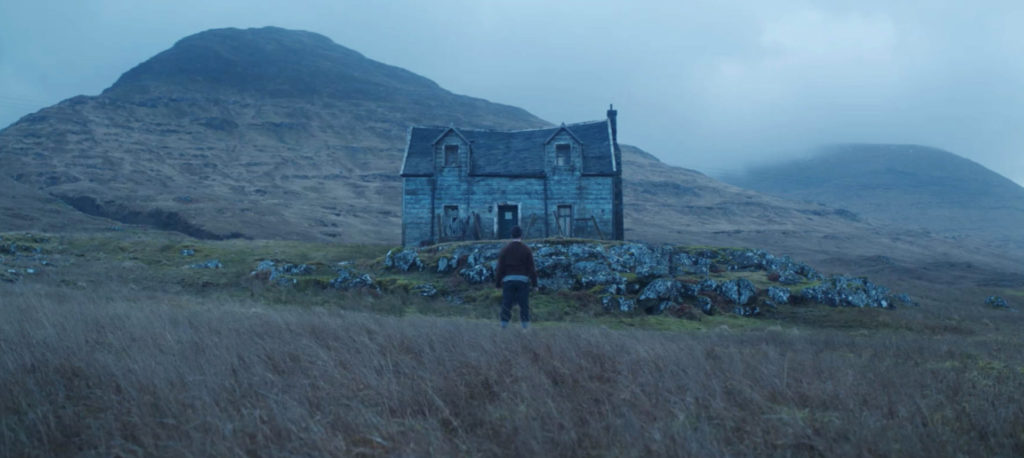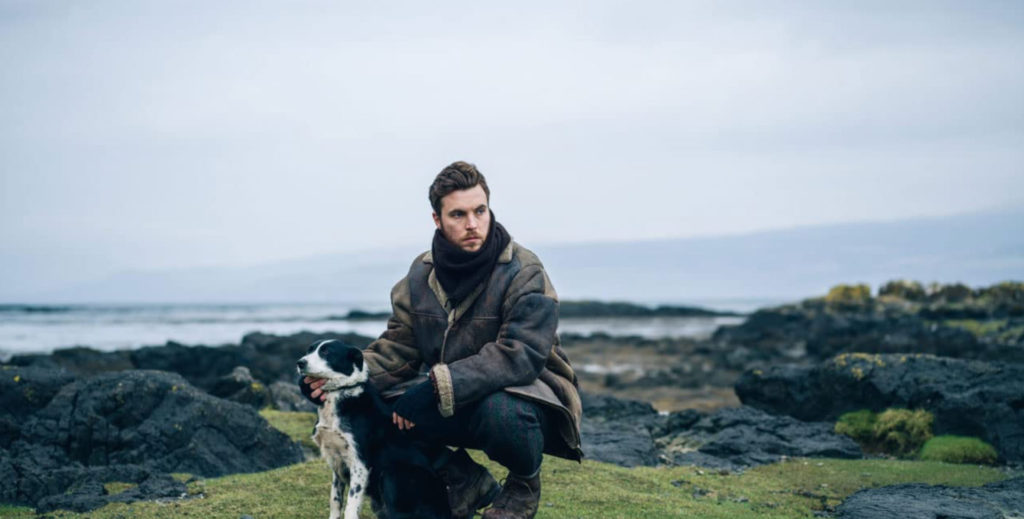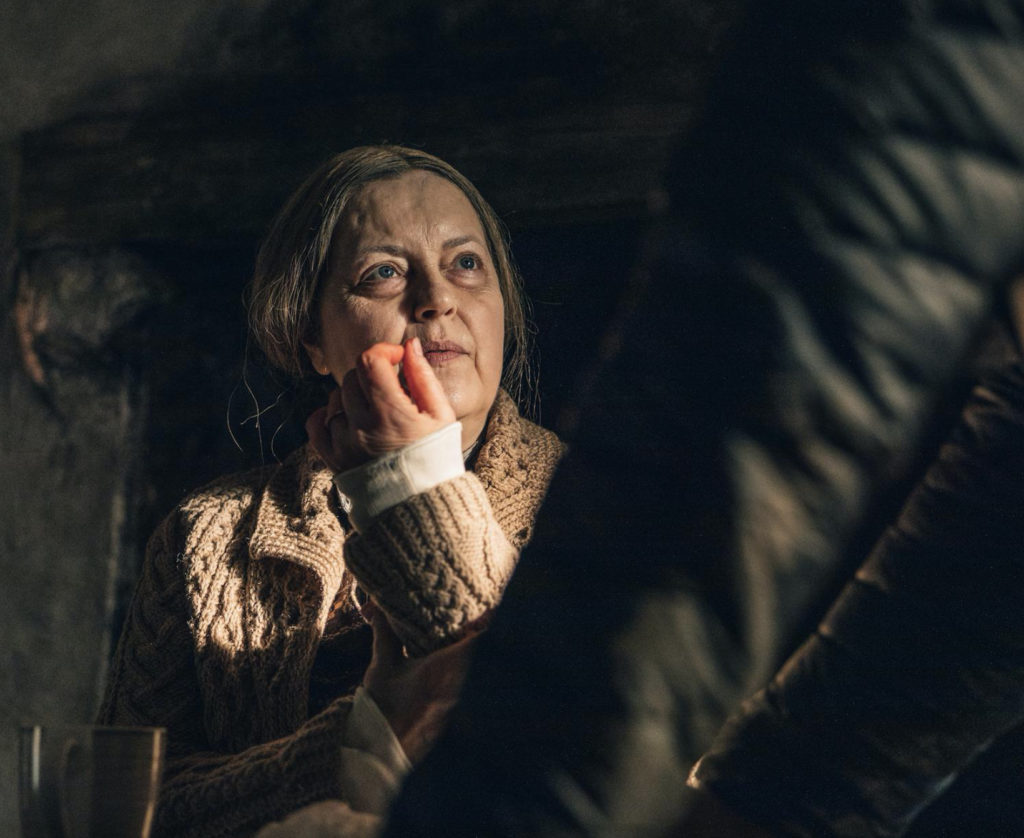
No matter what dreams people have for their futures, they still often end up being influenced by the past. That’s certainly true for London-based filmmaker Russell Owen and the protagonist in his new supernatural horror thriller, Shepherd. The filmmaker, who wrote, directed and produced the feature, was inspired to pen the script early in his career by his interest in ancient myths, legends and ghost stories early in his career.
But as Owen garnered more experience in the world of independent filmmaking, he began to question if he would ever be able make the drama. The movie’s solitary and isolated main character, Eric Black, whose growing sense of guilt over his wife’s recent death, has left him grappling over the prospects of his future. But the scribe-helmer’s steadfast belief in the story, which reflects the protagonist’s underlying sense of self-preservation, ultimately helped the project get made.
In Shepherd, Eric [Tom Hughes], who has become increasingly haunted by the recent death of his wife, seeks solitude by taking on a new position as the titular shepherd on a remote Scottish island. But the bleak desolation of the foreboding landscape and increasingly terrifying visions soon begin to overwhelm him, which ultimately push him to the brink of madness.
Owen and Hughes generously took the time recently to talk about writing, directing, producing and starring in Shepherd during individual exclusive interviews over Zoom. Shepherd is now in theaters and will be available On Demand and Digital tomorrow, May 10, courtesy of Saban Films.
Q: Russell, you wrote the script for the new supernatural horror film, Sheperd. What inspired you to pen the screenplay for the thriller? What was the process like of scribing the script?
RO: I came across the Smalls Lighthouse story, which is a Welsh story. It’s the same story that Robert Eggers used for The Lighthouse, but that movie’s set in New England.
I loved the idea of [mixing] isolation, claustrophobia and acrophobia into a horror story. Over here in the UK, there are also a lot of these little islands, and people go off to become a shepherd for a lighthouse on one of the islands. You get about 10,000 applicants because it’s like the dream job.
But I was thinking, what if someone who’s not of sound state of mind, as they’re dealing with grief and depression, was then in that situation? What would that look like? Of course, it would be horrifying. That was the spark of the idea.
I was very young when I wrote it, so I put it on the shelf when I was done with it, and then went to work on the rest of my career. Then an opportunity came to make it again, and I had a lot more [filmmaking] experience, so I pulled it off the shelf.
I then started rewriting it, from the perspective of a friend, who was suffering from depression. I added the things he had told me, and also put in a lot more of my experiences in there. So it was a quite cathartic, but a thoroughly enjoyable, process to put it on screen.
But the big question was if I could lift it off the paper and put it on screen. So I’m extremely proud of what we were able to do. What you read on the page is on the screen. It’s very surreal to have had it in my head for about 15 years, and then see it come to life.
Q: Besides writing the screenplay, you also directed the drama. How did penning the script influence the way you approached helming the movie?
RO: Well, to be honest, the overall production was a nightmare. We were over budget on certain things, since we were shooting on a very remote location, but it was the ideal location for the story. We also got the ideal cast.
But walking in and just directing was pretty easy because I had these scenes play out in my head for so long. [Owen laughs.] I also storyboard everything, exactly the way I want to see it; I think I have about 2,000 frames of storyboard for this film. I enjoy directing because I always make sure I go in prepared.
Q: Speaking of the cast, Sheperd stars Tom Hughes as Eric. What was the casting process like for the protagonist when you started production on the thriller?
RO: The casting was the biggest thing I was frightened about. While we have a lot of incredible actors on my doorstep – I live in London, so it’s actor central here – I knew this role was going to be a big challenge.
There aren’t many other actors to bounce off of [in the story]…as [Eric] only has a few other little vignettes with a few other actors. But the majority [of the story] is him [alone] on the island. So we had to find the ideal location to make sure whoever we got as the actor to play Eric had plenty to bounce off of.
Tom Hughes kept popping up on the top of the lists of Gemma Sykes, the casting director. I had seen him in a few other things, but on TV, he always plays a country gentlemen in period pieces, like Prince Albert (on Victoria), or a spy. So I said, “I don’t see it.”
Then she showed me [the dramatic mini-series,] Paula on BBC, on which he played this psychotic guy. I then immediately said, “I know exactly what you’re thinking.”
He didn’t really want any rehearsals, but we had a lot of conversations. I just gave him all of this information, and he built it all in his head.
I then just had to roll on the day and see what he came up with; he doesn’t give much away until the cameras start rolling, and everything comes out. He has a lot of story behind his eyes, which is really important because he had to be very watchable, and I was over the moon about it.

Q: Tom, you play the main character of Eric Black in Shepherd. What was it about the character, as well as the overall screenplay, that convinced you to take on the role?
TH: Russell sent the script to my agent, who sent it to me. I was on holiday, actually, when I got it, and I read it.
The world around me was different from the world in the script, but I still got completely immersed in it.
I really felt like I went on the journey of where Eric’s at. I felt empathetically drawn to him.
Then the residue of that stayed with him, and I couldn’t quite shake it for a few days. With any story, that’s a good sign.
When I got back from holiday, I rang my agent and said, “I really want to do this.” I then met Russell and we had a chat.
There were also two other elements to it that I thought were really exciting; I’ve never been in a horror film or project before, so it’s not a genre I knew a lot about. So to learn about that from the inside was really exciting.
Also, if I’m really honest, there was a challenge, as an actor, to try to tell a story on your own for most of the film, and that was really exciting, as well. So I thought I had to be the one to tell this story, and felt very fortunate that I was [able to be] that person.
Q: Speaking of the fact that Russell directed, as well as wrote, the film, what was your experience like of collaborating with him on the development of your character of Eric during the production?
TH: The relationship between an actor and a director, particularly a writer-director, is always incredible, because you’re stepping into their view of the world. But on this film, it was particularly imperative that there was a strong communication between us because we were both very isolated.
Myself, Russel and Richard Stoddard, the Director of Photography, became a bit of a cannon and triangle of support. There was only one actor, director and cinematographer on the island 90 percent of the time, so we really had to lean on each other.
I also think that Eric and Russel are very different people, but there’s definitely a touch of Russel in Eric. So it felt important to me to be close to him, because it’s not [Russel’s] own personal story I’m telling; it’s instead the story he’s telling from his imagination. Therefore, I needed to get to know him, as well as Eric.
We had a great relationship from the beginning, and he was a great collaborator. If we didn’t have the strength of communication between us and Richard, I don’t think we would have gotten the film made.
Q: During the production, how did you approach working with Richard as the cinematographer, in terms of building the world that Eric lives in?
TO: As a director, I have some very specific ways I want to shoot certain things for the story. So we were always thinking and talking about how we were going to do things. About a week or two in, we clicked and got into the flow of things, in that sense. It was a different way of working for both of us, but I learned so much from it, and enjoyed it.
TH: I think the relationship between a cinematographer and actor is also paramount, no matter what story you’re telling.
I felt like I needed to immerse myself on this character on camera to make it tangibly real because I didn’t have the usual forms of communication as an actor. I didn’t have much dialogue or many scenes with other people to bounce things off of.
So I tried to show things rhythmically that were hard to find at times. So trying to find communication between myself and Richard was really important.
I was quite lucky because Richard was also the camera operator on my first-every acting job. So I already had experience working with him…so were hit the ground running [on Shepherd]. I owe big thanks to him for really staying with, and being understanding of, my performance, and I couldn’t have done it without him.

Q: Speaking of the fact that in many of the scenes, you’re by yourself on screen, what was the experience like of acting, and telling Eric’s story, by yourself during most of the production?
TH: It was exciting, but also a real challenge. I didn’t really approach it any differently than how I approach any job, though. As an actor, I try to cheat as little as I can, in terms of my performance.
I also took faith in the fact that I’m trying to live in a situation, and people will hopefully be able to reach it. But I’m not sure if that has worked. [Hughes laughs.]
I love the challenge of it…sometimes you can hide behind dialogue. You can say a line well, and it does half the work for you, particularly if it’s good writing. This felt quite exposing, but I felt up to the challenge, and was excited by it. I felt like I walked away, having learned a lot about myself as an actor and a person.
Q: After his wife’s death, Eric seeks solitude, so he takes on a job as the eponymous shepherd on a remote Scottish island. What was the process like of shooting the drama on location?
RO: Filming on an island is massively tricky, particularly when the roads can’t fit big trucks. It was also a very remote place, and we were building sets there.
It’s also one of the windiest places in Europe, and some of the sets were made out of giant sails. We also filmed during the middle of winter in Scotland.
But we spent a long time looking for that location [on the west coast of Scotland]. No one had really filmed on that part of Scotland before; big films have shot on the east coast, but the west coast is too difficult to get to, as it’s too remote.
But it’s so majestic, and had a life of its own…it’s otherworldly, and there’s something special about it. It was a complete pleasure to film there.
TH: The landscape was incredible in many ways. My own personal experience with the island was magnificent; it was beautiful.
But in terms of doing my job, and bringing Eric to life, [the location] became the most important thing to me, as that’s what he experienced. It was him meeting nature. Everything tumbled out of him, and came back to him in a warped view of nature; the power of nature was what was driving him.
So to be immersed in truly powerful nature – Scotland’s one of the most breathtaking countries anywhere – was exciting. To be on an island that was 85-90 percent uninhabited was incredible, in terms of bringing Eric to life. To shot on an island like that was incredible.
Q: Russell, in addition to scribing and directing Shepherd, you also served as one of its producers. Why did you decide to also produce the movie, and how did you balance your helming and producing duties during the production?
RO: We had several other producers who were also working on the film, but most of the time, they were working on it back in London. There were a lot of challenges with that, as we went over budget, and had to deal with backends of hurricanes, which led to us having to cancel days of shooting.
I never want to produce on another production again. [Owen laughs.] I just want to do my writing and directing.
There’s a lot to be said about having a great producer on board who’s there 100 percent of the time.
For this one, they weren’t always there, so I did jump in.
I do have my own production company, but we came in on second unit, like for a scene where we drop a car off of a cliff. That was much easier because I didn’t have to do much directing there; I just had to say, “Drop the car,” and set the camera up.
On paper, this is a simple project, as there was one man on an island. But it’s the simple ones that surprise you. [Owen laughs.]

Q: Saban Films [distributed] Sheperd in theaters on May 6, and will also release it On Demand and Digital on May 10. What was the process like of deciding how you wanted to release the thriller?
RO: It’s a gift and privilege to have the film on a big screen because that’s what we made it for. We made it just before the pandemic, and then we went into that.
So there were lots of thoughts that we might sell it to a streamer, which is a shame because we spent so much time on the music, sound design and cinematography, purely for the big cinema experience, so that you can absorb yourself in the film. So to still be able to secure a cinema release, and at least have a limited audience see it on the big screen, is so important.
We’ve been lucky because we’ve already had the movie be released in cinemas around the world. It’s already came out in the UK, so I’m really pleased about it.
Check out more of Karen’s articles.
Here’s the trailer of the film.

